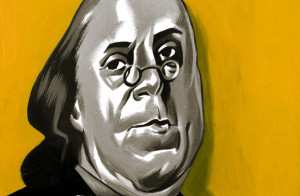From ancient Jerusalem to the American Revolution and beyond, rebels have risen up against the burden of taxation.
March 19, 2020
With the world in the grip of a major health crisis, historical milestones are passing by with little notice. But the Boston Massacre, whose 250th anniversary was this month, deserves to be remembered as a cautionary tale.

ILLUSTRATION: THOMAS FUCHS
The bloody encounter on March 5, 1770, began with the harassment of a British soldier by a crowd of Bostonians. Panicked soldiers responded by firing on the crowd, leaving five dead and six wounded. The colonists were irate about new taxes imposed by the British Parliament to pay for the expenses of the Seven Years War, which in North America pitted the British and Americans against the French and their Indian allies. Whether or not the tax increase was justified, the failure of British leaders to include the American colonies in the deliberative process was catastrophic. The slogan “No taxation without representation” became a rallying cry for the fledgling nation.
The attitude of tax collecting authorities had hardly changed since ancient times, when empires treated their subject populations with greed, brutality and arrogance. In 1st century Judea, anger over the taxes imposed by Rome combined with religious grievances to provoke a full-scale Jewish revolt in 66-73 A.D. It was an unequal battle, as most tax rebellions are, and the resistors were made to pay dearly: Jerusalem was sacked and the Second Temple destroyed, and all Jews in the Roman Empire were forced to pay a punitive tax.
Even when tax revolts met with initial success, there was no guarantee that the authorities would carry out their promises. In 1381, a humble English roof tiler named Wat Tyler led an uprising, dubbed the Peasants’ Revolt, against a new poll tax. King Richard II met with Tyler and agreed to his demands, but only as a delaying tactic. The ringleaders were then rounded up and executed, and Richard revoked his concessions, claiming they had been made under duress.
Nevertheless, as the historian David F. Burg notes in his book “A World History of Tax Rebellions,” tax revolts have been more frequent than we realize, mainly because governments tend not to advertise them. In Germany, 210 separate protests and uprisings were recorded from 1300 to 1550, and at least 1,000 in Japan from 1600 to 1868.
The 19th century saw the rise of a new kind of tax rebel, the conscientious objector. In 1846, the writer and abolitionist Henry David Thoreau spent a night in the Concord, Mass., jail after he refused to pay a poll tax as a protest against slavery. He was released the next morning when his aunt paid it for him, against his will. But Thoreau would go on to withhold his taxes in protest against the Mexican-American War, arguing in his 1849 essay “Civil Disobedience” that it was better to go to jail than to “enable the State to commit violence and shed innocent blood.”
Irwin Schiff, a colorful antitax advocate and failed libertarian presidential candidate, wouldn’t get off so easily. Arguing that the income tax violated the U.S. Constitution, he refused to pay it, despite being convicted of tax evasion three times. In 2015, he died at age 87 in a federal prison—an ironic confirmation of Benjamin Franklin’s adage that “nothing can be said to be certain, except death and taxes.”
Fortunately for Americans at this time of national duress, tax day this year has been mercifully postponed.







